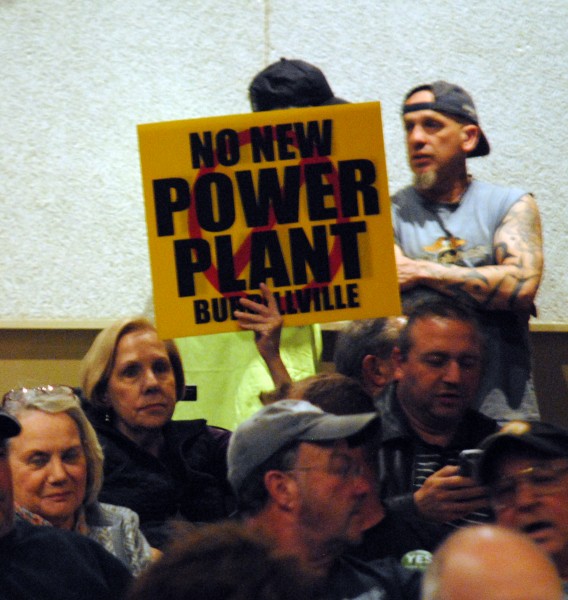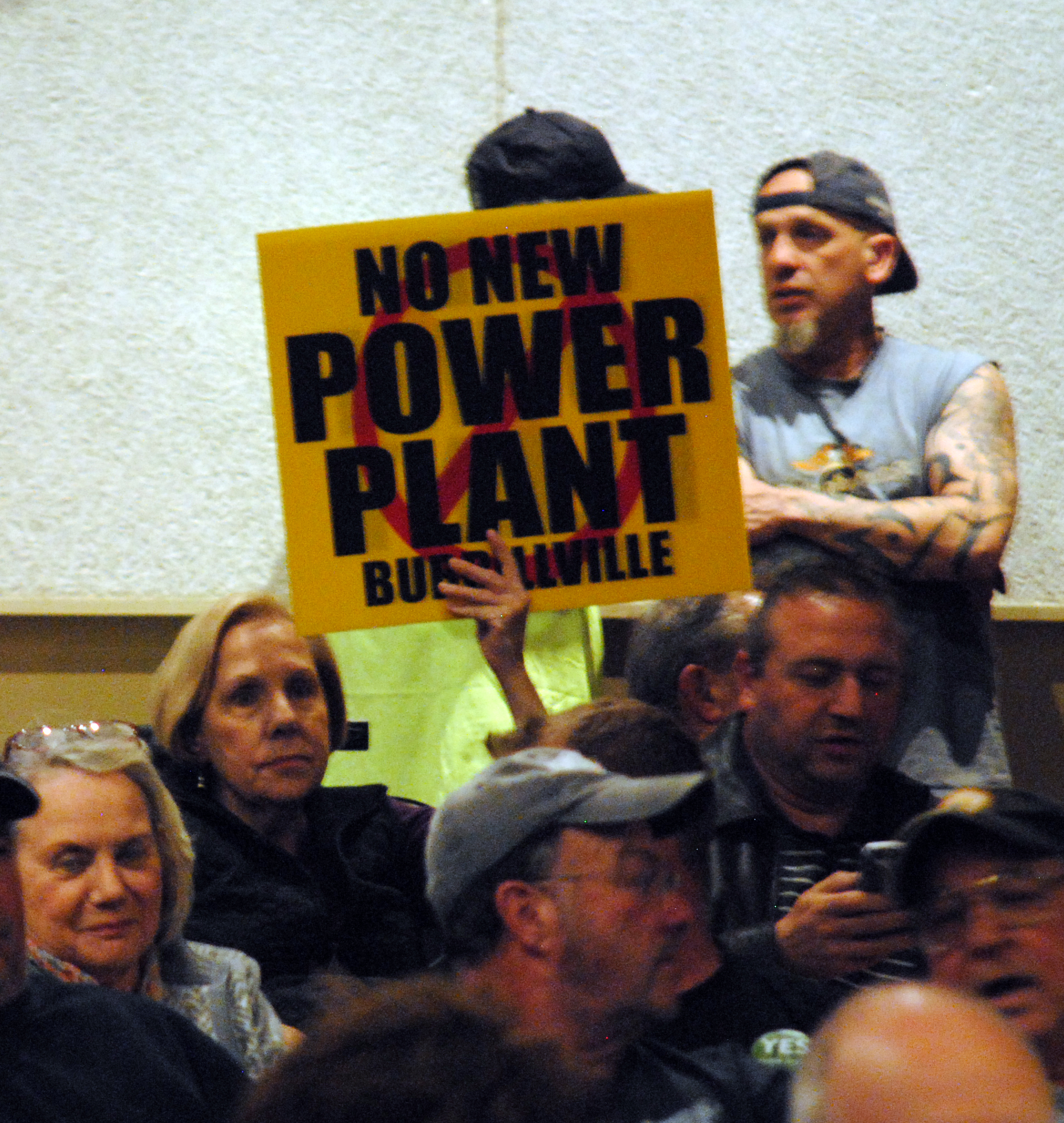 The bill Representative Cale Keable introduced to the RI House that seeks to overhaul Rhode Island General Law 44-4-30 by giving the residents of Burrillville more power over whether or not Invenergy‘s proposed fracked gas and diesel oil burning power plant gets built in their town has been reviewed by Conservation Law Foundation (CLF) Senior Attorney Jerry Elmer, and his verdict is clear: “Despite its imperfections,” says Elmer, “the Keable Bill is an excellent bill that ought to be supported by enviros, because – for the two separate reasons outlined above — it makes it much less likely that the Invenergy plant will be built.”
The bill Representative Cale Keable introduced to the RI House that seeks to overhaul Rhode Island General Law 44-4-30 by giving the residents of Burrillville more power over whether or not Invenergy‘s proposed fracked gas and diesel oil burning power plant gets built in their town has been reviewed by Conservation Law Foundation (CLF) Senior Attorney Jerry Elmer, and his verdict is clear: “Despite its imperfections,” says Elmer, “the Keable Bill is an excellent bill that ought to be supported by enviros, because – for the two separate reasons outlined above — it makes it much less likely that the Invenergy plant will be built.”
You can read House Bill 8240 here.
Elmer’s analysis is worth reading in its entirety:
Main Point of the Bill – The main point of the bill appears on page 4. Under existing law (RIGL 44-4-30) the Burrillville Town Council has the power to set the property tax rate for Invenergy at any level it wants. Thus, under existing law, the Town Council could give Invenergy a sweetheart deal by charging one dollar per decade; or the Town Council could drive Invenergy out of Burrillville by charging a million dollars per nano-second. The Keable bill changes this by adding the requirement that, whatever the Town Council does, that arrangement must be approved by the voters of Burrillville in a voter referendum. This is a very, very good thing because it makes it much less likely that the plant will be built. In fact, this is true for two separate reasons:
First, many people have been worried that the Burrillville Town Council will make a secret sweetheart deal with Invenergy, and that the people of Burrillville will be cut out of the process. People have been very worried about this, because the people of Burrillville are overwhelmingly opposed to the Invenergy proposal, but the Town Council seems (much) more favorably inclined toward Invenergy. If passed, this law would make it impossible for the Town Council to cut the people of Burrillville out of the process. Any deal the Town Council makes with Invenergy would have to be approved by the voters; and the voters could vote down any tax treaty with Invenergy that does not ensure, with 100% certainty, that the plant is not built.
Second, even the presence of this law on the books creates uncertainty for Invenergy – at least until a tax treaty is negotiated and approved by public referendum. This uncertainty will probably make it more difficult (and maybe impossible) for Invenergy to obtain the necessary funding (loans) to start construction. After all, what lender would put up hundreds of millions of dollars knowing that the Town could tax Invenergy out of existence? Importantly, in a situation like this, delay (“mere delay”) can actually kill the project. As CLF argued at the [Energy Facilities Siting Board] EFSB, Invenergy made the election to obtain a Capacity Supply Obligation (CSO) in the ISO’s Forward Capacity Auction (FCA) on February 8, 2016, before Invenergy had the necessary state permits. That CSO begins on June 1, 2019, and it comes with huge financial penalties if Invenergy is not up and running by that time. If Invenergy is delayed in starting construction by even 12 months, Invenergy may be forced to sell out of its CSO (in an effort to avoid penalties) and abandon this project.
Note, importantly, that what I say in that last paragraph is true even if the EFSB grants Invenergy a permit! In other words, if passed, the Keable bill provides a separate and independent way of stopping Invenergy, a way that works even if CLF’s litigation against Invenergy in the EFSB fails.
In this sense, the Keable bill is clearly good for democracy. Up until now, many people have feared that the Town Council would secretly cut a sweetheart deal with Invenergy, despite overwhelming citizen opposition within the Town. If passed, the Keable bill would make that impossible.
Changing the Make-Up of the EFSB – The Keable bill would also change the make-up of the EFSB by expanding the EFSB from three to nine members. (Bill, page 1, lines 7 to 14) Currently two of the three members of the EFSB sit at the pleasure of the Governor (and this provision in the Keable Bill is probably intended to change that status quo). I am skeptical about how useful this provision would be, even leaving aside the unwieldiness of a nine-member EFSB. Note that two EFSB members now sit at the pleasure of the Governor. One of the proposed new members under the Keable Bill is the chairperson of the Commerce Corporation, who also sits at the pleasure of the Governor. Of the three “public members” to be added, the union representative will reliably support all new power plant construction, and the person “experienced in energy issues” may very well also reliably support new power plants. That would be five members of a nine-member EFSB that would reliably support new power plants. While well-intentioned, this provision is probably not a good way to stop the Invenergy proposal, or to constitute a better EFSB.
Considering a Town Council Resolution – The Keable bill contains this sentence (page 3, lines 18-19): “Prior to making a decision, the board [EFSB] shall take into consideration any town or city council resolution regarding the application.” This is toothless – for two reasons. First, “take into consideration” means “think about” but not necessarily respect or act upon. Second, as we know in this case, the Town Council is much more favorable toward Invenergy than the people of the Town.
Nevertheless, I want to be clear: Despite its imperfections, the Keable Bill is an excellent bill that ought to be supported by enviros, because – for the two separate reasons outlined above — it makes it much less likely that the Invenergy plant will be built.
What are the chances of passage? – Of course, the honest answer is, “I don’t know.” On the one hand, in order to have been introduced this late in the General Assembly session (three months after the filing deadline for new bills), the bill must have some support from leadership. On the other hand, if passed, this bill would go a long way to un-doing the whole purpose, the raison d’etre, of the state’s Energy Facility Siting Act that created the EFSB. That statute was designed to take the power to stop a proposal like Invenergy’s out of the hands of the local people (who could be motivated by base NIMBYism) and put it into the hands of the EFSB. This bill (not so much the change in EFSB membership, but the tax treaty referendum requirement) goes a long way to un-doing that purpose. Also, there is, as of yet, no Senate-side analogue of the Keable Bill in the House. Also, remember this: Governor Raimondo is a huge supporter of the Invenergy proposal going forward (because of the job-creation aspects). Even if the bill passes the General Assembly, Gov. Raimondo could still veto the bill – especially if her analysis of the bill’s real-world effects jibes with my own. My analysis is that, if passed, the bill would make it much less likely that the Invenergy plant will ever be built. If Gov. Raimondo agrees with me, she might veto the bill for that very reason.
Hearing on Thursday – Although not yet posted on the General Assembly website, Rep. Keable believes that his bill will be heard this Thursday in the House Environment Committee, at the Rise of the House (some time after 4 PM).


